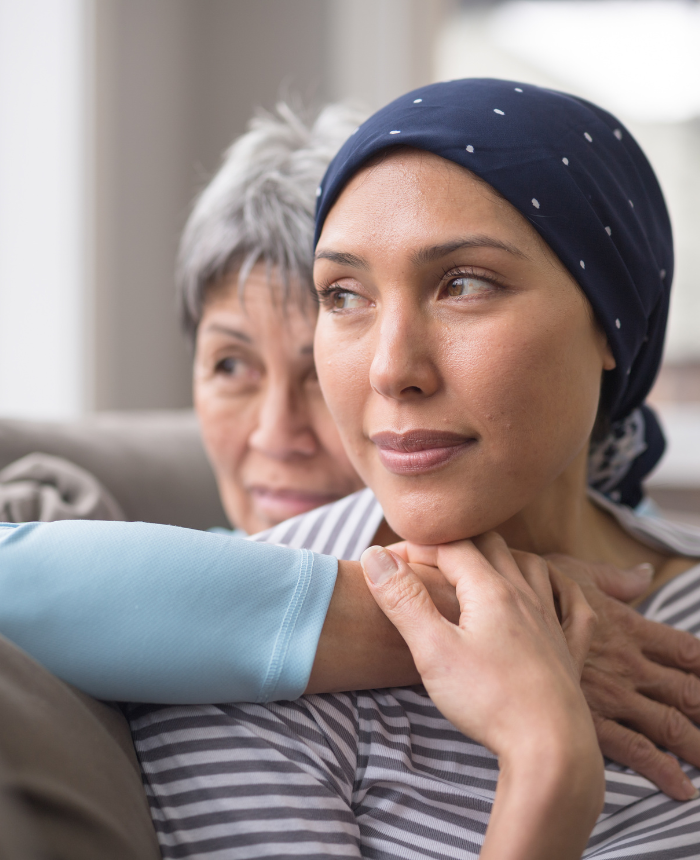
Gynecologic Cancers
A diagnosis of gynecologic cancer comes with many questions. Below, we address some of the most common questions we receive, but you can always contact us if you don’t find the answers you need here. Our resources page may also have the information you’re looking for.
What is gynecologic cancer?
The term gynecologic cancer refers to any cancer that affects part of the biological female reproductive system. The most common female cancer types include cervical, ovarian, uterine, vaginal, and vulvar cancers. It’s possible, but less likely, to develop gynecologic cancer in the fallopian tubes. Each type has different symptoms, risk factors, and potential treatments.

Gynecologic Cancers
A diagnosis of gynecologic cancer comes with many questions. Below, we address some of the most common questions we receive, but you can always contact us if you don’t find the answers you need here. Our resources page may also have the information you’re looking for.
What is gynecologic cancer?
The term gynecologic cancer refers to any cancer that affects part of the biological female reproductive system. The most common female cancer types include cervical, ovarian, uterine, vaginal, and vulvar cancers. It’s possible, but less likely, to develop gynecologic cancer in the fallopian tubes. Each type has different symptoms, risk factors, and potential treatments.
Who is at risk for gynecologic cancer?
Gynecologic cancers can develop in anyone with female reproductive organs. However, modern testing and preventative measures can help reduce risk, and there is a wide range of treatment options, depending your situation. Good communication with your doctor will ensure that you get the help you need.
Common risk factors include:
- Family history: Many gynecologic cancers, such as ovarian cancer, have a genetic component. If someone in your family has had a gynecologic cancer, it’s particularly important to keep an eye out for symptoms.
- Weight: Some cancers, such as endometrial cancer, are more likely to affect those in a higher weight range. Weight can increase estrogen production and cause inflammation, which may lead to more risk for certain kinds of gynecologic cancer.
- Age: Those over age 60 are more likely to develop gynecologic cancer.
- Human Papillomavirus (HPV): This sexually transmitted disease is often associated with cervical cancer in particular.
What are some symptoms of symptoms of gynecologic cancer?
Paying attention to your body and any unusual changes can help you determine if you’re experiencing any symptoms of gynecologic cancer. Your doctor can provide you with the support and information you need to take the next step.
While symptoms can vary depending on the type of cancer, there are some general things to keep an eye out for:
- Abnormal bleeding
- Heavier/painful periods
- Difficult or painful urination
- Abdominal bloating
- Diarrhea
- Pelvic pain
- Any mass or sore
Abnormal bleeding
Difficult or painful urination
Abdominal bloating
Diarrhea
Pelvic pain
Any mass or sore
What treatments are available for gynecologic cancer?
Thanks to increased research and clinical trials, there are many options for gynecologic cancer treatment. The best type of treatment for you will depend on your current health situation, as well as the stage of cancer and whether it has spread to other parts of the body.
Common treatments include surgery, radiation, and/or chemotherapy.
Surgery may involve a hysterectomy, or removal of the uterus and other reproductive organs. Lymph nodes are also sometimes removed, and your surgeon will check for cancer cells in the abdominal fluid. Surgery may be followed up with radiation or chemotherapy to make sure there are no lingering cancer cells.
Radiation therapy can help control cancer growth by damaging cancer cells so that the body can remove them. There are a variety of radiation therapies, including intensity-modulated radiation therapy (IMRT), image-guided radiation therapy (IGRT), and stereotactic body radiotherapy (SBRT).
Chemotherapy can be used on its own or in tandem with other kinds of treatments. It is most commonly given through an infusion. The drug and dosage will vary depending on your diagnosis, so it’s important to discuss your treatment plan with your doctor.
What are some common side effects of gynecologic cancer treatment?
Gynecologic cancer treatments sometimes come with side effects, but taking good care of yourself before and after treatments can help.
Side effect: Fatigue
What you can do: Get plenty of rest, and pace your daily tasks if needed. When possible, eat well and include some light to moderate activity in your day.
Side effect: Skin reactions
What you can do: Use gentle skin products with aloe or lanolin, and contact your doctor if you notice a rash or anything else unusual.
Side effect: Vaginal dryness and other changes
What you can do: Dilators and moisturizers may be helpful, but be sure to discuss your options with your doctor first.
Side effect: Diarrhea
What you can do: Fiber supplements, a bland and low-fiber diet, small meals and lots of clear liquid can help prevent diarrhea. Keep a food diary to help you determine if any foods cause diarrhea or make it worse, and be sure to share this information with your provider and/or dietitian. If you have pain or inflammation caused by diarrhea, you can use baby wipes or moist toilet paper, apply petroleum jelly to irritated skin and soak in a tub with warm water.
Schedule Your Appointment Today
If you have been referred for radiation therapy, the choice of where to receive treatment is yours. Our Brockton clinic offers the advanced treatments you need at a convenient location. Call us today to book a consultation.
